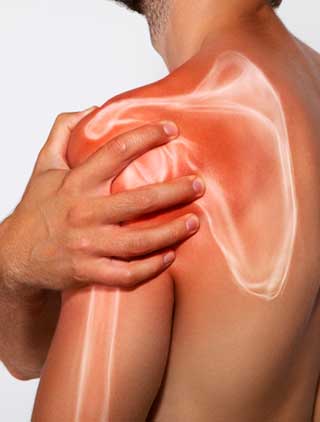
Osteopathic treatment for frozen shoulder includes stretches, manual manipulation, and other techniques that loosen tight tissue around the joint, increase mobility, and reduce pain.
Frozen shoulder, or adhesive capsulitis, is a painful shoulder condition that typically involves discomfort and stiffness around the shoulder joint. Unlike many shoulder ailments, this one can take time to develop and can become quite painful before it resolves itself. The condition tends to progress in three stages, with each characterized by their own symptoms. Those stages include the freezing stage, the frozen stage, and the thawing stage. Together, those three stages of progressive freezing and thawing can last for anywhere from a year to more than four years.
Frozen shoulder occurs when the shoulder capsule thickens and tightens to the point where it loses its range of motion. That capsule is made up of all the tissue that surrounds your shoulder joint. When it becomes thicker and tighter, two things happen: scar tissue forms and the amount of lubricating synovial fluid drops. Those effects combine to reduce mobility, which increases the pain and stiffness.
While this condition generally resolves itself, osteopathic care can help to relieve symptoms and expedite the healing process.
Medical science has yet to determine the exact causes for this shoulder condition. However, they have identified risk factors that can help patients understand when they might be more prone to suffering from adhesive capsulitis:
As noted, the symptoms associated with this condition can change depending on its progression. The three stages and their symptoms include:
In addition to pain and limited mobility, patients can experience dull aches and sleeplessness. Osteopathic care can be an effective way to address these symptoms.
Leonid Tafler, D.O. can provide the osteopathic treatment you need to relieve pain, improve mobility and range of motion, and expedite your body’s natural healing process. Treatment options can include manual manipulation, appropriate exercises, and lifestyle changes.

Shoulder-related conditions can be due to wear and tear, injury, or repetitive use, and can result in pain, loss of mobility, numbness, and tingling in the upper extremities.
Biceps TendonitisFrozen ShoulderRotator Cuff InjuriesShoulder ImpingementShoulder PainShoulder Tendonitis/Bursitis
If you are experiencing these symptoms, please contact us today. We can schedule an appointment, confirm your diagnosis, and prepare a treatment plan that can help you overcome pain and stiffness and regain your lost quality of life.